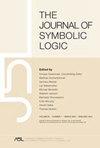证明复杂性猜想和不完备性定理
IF 0.6
3区 数学
Q3 LOGIC
引用次数: 0
摘要
摘要给定一个可靠的一阶p时间理论T,能够形式化一阶逻辑的语法,我们定义了一个p时间函数$g_T$,它将所有输入延伸1位,并利用它的性质证明了T一定是不完全的。对于某些T, $g_T$的范围是否与所有无限的${\mbox {NP}}$集合相交(即,它是否是一个对所有证明系统都很难的证明复杂性生成器),我们将其作为一个开放问题。该结构的命题版本表明,以下三个陈述中至少有一个是正确的:不存在p最优命题证明系统(这相当于不存在时间最优命题证明搜索算法)。2. $E \not \subseteq P/poly$。3.存在一个函数h,它将所有输入延展1位,在次指数时间内可计算,其值域$Rng(h)$与所有无限的${\text {NP}}$集合相交。本文章由计算机程序翻译,如有差异,请以英文原文为准。
A proof complexity conjecture and the Incompleteness theorem
Abstract Given a sound first-order p-time theory T capable of formalizing syntax of first-order logic we define a p-time function $g_T$ that stretches all inputs by one bit and we use its properties to show that T must be incomplete. We leave it as an open problem whether for some T the range of $g_T$ intersects all infinite ${\mbox {NP}}$ sets (i.e., whether it is a proof complexity generator hard for all proof systems). A propositional version of the construction shows that at least one of the following three statements is true: 1. There is no p-optimal propositional proof system (this is equivalent to the non-existence of a time-optimal propositional proof search algorithm). 2. $E \not \subseteq P/poly$ . 3. There exists function h that stretches all inputs by one bit, is computable in sub-exponential time, and its range $Rng(h)$ intersects all infinite ${\text {NP}}$ sets.
求助全文
通过发布文献求助,成功后即可免费获取论文全文。
去求助
来源期刊
CiteScore
1.20
自引率
16.70%
发文量
79
审稿时长
6-12 weeks
期刊介绍:
The Journal of Symbolic Logic publishes research in mathematical logic and its applications of the highest quality. Papers are expected to exhibit innovation and not merely be minor variations on established work. They should also be of interest to a broad audience. JSL has been, since its establishment in 1936, the leading journal in the world devoted to mathematical logic. Its prestige derives from its longevity and from the standard of submissions -- which, combined with the standards of reviewing, all contribute to the fact that it receives more citations than any other journal in logic.

 求助内容:
求助内容: 应助结果提醒方式:
应助结果提醒方式:


